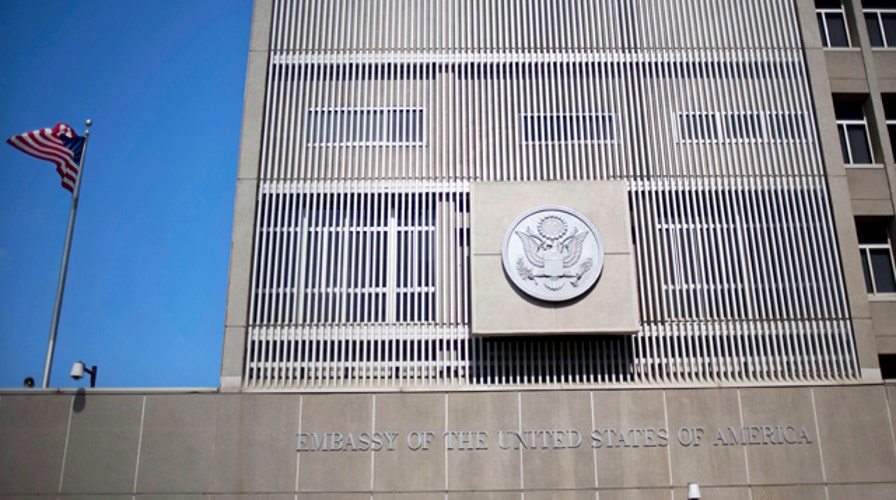What do US embassy closures mean for US interests overseas?
Reaction from Middle East expert Michael Singh
The terror threat that led to the closure of nearly two-dozen U.S. embassies and consulates resulted from intercepted communications between the head of Al Qaeda and the leader of its Arabian Peninsula affiliate, a U.S. intelligence source tells Fox News.
The confirmation shows just how high the alleged threat goes in the terror network and is the most specific detail to emerge over the nature and origin of the threat. The source said the communications were intercepted between Ayman al-Zawahiri -- who is Usama bin Laden's successor -- and Nasir al-Wuhayshi, head of Al Qaeda in the Arabian Peninsula.
Asked about the claim, officials with the CIA and Office of the Director of National Intelligence would not confirm the details of any such intercepted communications.
Earlier in the day, officials with the White House and State Department declined to provide further specifics about the nature of the threat. White House Press Secretary Jay Carney would say only that the threat potentially goes "beyond" the Arabian Peninsula.
Carney reiterated that officials view the threat, which also prompted a worldwide travel alert last week, as "significant."
"Our information suggests they may focus efforts to conduct attacks in the period between now and the end of August," Carney said.
Some analysts pointed to the lack of specificity in questioning whether the threat was being blown out of proportion.
Anthony Shaffer, a former military intelligence officer who now works with the Center for Advanced Defense Studies, said this might just be "Al Qaeda pushing our buttons" to see how the U.S. responds.
"It's a test in my judgment," he told FoxNews.com. "I think this is a trial balloon by Al Qaeda to see how we would react."
Thomas Sanderson, senior fellow with the Center for Strategic and International Studies Transnational Threats Project, also told FoxNews.com that an Al Qaeda trial balloon is "not beyond the realm of possibility with them."
At the same time, he said such a ruse would come with an added risk of giving away the locations of those involved. Considering the claims that the intelligence includes communications from Zawahiri himself, Sanderson said that detail suggests the threat is credible.
"It's very difficult to determine what the real nature of this is," he said.
The New York Times first reported on the intercepted communications. The Times reported that intercepted electronic communications showed Zawahiri telling the AQAP head to conduct an attack as early as this past Sunday.
State Department spokeswoman Marie Harf pushed back when asked at Monday's press briefing about the possibility that the intelligence was a ruse.
"Without speaking to the specific stream of reporting, without getting into the intelligence on this threat, our folks that look at these things and analyze them always take a very hard look at them to make sure that they're credible ... to look at them to see if they're ... possibly something to throw us off," Harf said.
Michael Singh, at The Washington Institute for Near East Policy, said officials evidently find the intelligence "very credible" considering the steps they're taking. He said the sheer breadth of the response, though, signals "maybe there are some specifics that are missing here."
The U.S. government closed 22 embassies and consulates on Sunday, and extended the closure for 19 U.S. posts through the end of this week.
The worldwide travel alert issued on Friday lasts until the end of August.
Lawmakers briefed on the information have likened the "chatter" to intelligence picked up before the Sept. 11, 2001 attacks.
One lawmaker said the chatter was specific as to certain dates and the scope of the operation; others said it suggested that a major terrorist attack, akin to 9/11, was being planned by the Al Qaeda affiliate in Yemen.
Diplomatic facilities will remain closed in Egypt, Jordan, Libya, Yemen, Saudi Arabia and Kuwait, among other countries, through Saturday, Aug. 10. The State Department announcement Sunday added closures of four African sites, in Madagascar, Burundi, Rwanda and Mauritius. The U.S. reopened some posts on Monday, including those in Kabul, Afghanistan and Baghdad.
Spokeswoman Jen Psaki said the decision to keep certain embassies and consulates shuttered throughout the week was done out of an "abundance of caution" and to "protect our employees, including local employees, and visitors to our facilities."
Fox News' Jennifer Griffin and FoxNews.com's Judson Berger and The Associated Press contributed to this report.





